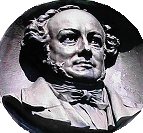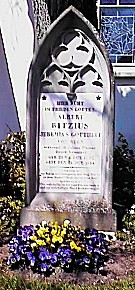SWITZERLAND
GOTTHELF
|
|
ALL ABOUT SWITZERLAND |
|
JEREMIAS GOTTHELF |
||||
|
Gotthelf Keller Johanna Spyri · Heidi Dürrenmatt Max Frisch |

|
Jeremias GotthelfPastor and Rural Novelist
Jeremias Gotthelf is a pseudonym of Albert Bitzius |
Reverend Jeremias Gotthelf [Gotthelf = may God help] understood his writings as continuing cure of souls with other means. He is one of the best known Swiss authors and was still very popular in the 1950's, when his major works were brought to the movies and could be heard as radio plays. His novels and short stories are situated in the world his congregation lived in: his characters are farmers, their wives, farmhands and maids. Though he wrote in standard German, there are many dialect expressions in his language.
His message is conservative and very critical against the "Zeitgeist" [spirit of the age] - we find this very expression twice in the title of major works. Gotthelf foresaw the consequences of industrialisation and railroad building for general lifestyle and culture quite clearly and tried to keep this out of his rural world as long as possible. One might (and some people do) see this as a heroic fight for eternal values.
But to be honest: would you want to go back to the early 19th century? Would you like to live in a house without water taps, without electricity etc.? Would you prefer strict moralism in every detail (more or less Victorian type) to modern principles of freedom and personal responsibility? At least in Switzerland, most people pleading for "good old time religion and moral" would simply not be able to survive in a real 19th century world without modern technology.
| 1797 Oct, 04 |
Albert Bitzius is born in Murten
as son of pastor Sigmund Bitzius und his wife Elisabeth.
Only a few months after his birth, Switzerland is shaken by the
Helvetic Revolution,
the reign of patrician elites in the cities over the rural population
comes to an end and French troops are called in by French speaking
revolutionaries in western Switzerland to help them fight the Bernese
authorities unwilling to accept change that is long overdue. Little Albert Bitzius grows up in a time that is characterized by chaos. We can feel the yearning of this boy for a world with clear rules on every page of his later writings. |
| 1805 | Sigmund Bitzius is sent to Utzensdorf by his church,
he has to give high school education to his sons himself because there
is no high school in the region. This also is an inevitable aspect of the "good old days" - today 12-year-old high school students ride to their high school in Burgdorf within 14 minutes by train, and one has to consider that reforms of Switzerland's school system, initiated by Heinrich Pestalozzi (a leading 1798 revolutionary), had not yet reached every village, because first they had to set up colleges and educate the teachers ... |
| 1812 | Albert Bitzius attends a high school in Bern |
| 1813 Dec, 23 |
Austrian troops occupy Switzerland, the old regime returns to power in Bern. |
| 1814 - 1820 | Albert Bitzius studies theology at the theological college in Bern (the university of Bern does not yet exist ...) |
| 1821 | Studies at the renowned University of Göttingen, Germany. Afterwards Albert Bitzius travels through northern Germany: his only experience outside Switzerland. Most of what he sees in German villages (would someone else have had a different point of view?) is very negative: he describes them as filthy and the population as showing little own initiative - in contrast to the rural population around Bern. |
| 1822 | Albert Bitzius is a vicar [assistant pastor] in Utzenstorf. |
| 1824 | After the death of his father Sigmund Bitzius his church sends Albert Bitzius as a vicar to Herzogenbuchsee, a small town. |
| 1826 | Albert Bitzius attends an annual meeting of the Helvetic Society
in Langenthal. The Helvetic Society had been founded in
1762 (Age of Enlightment!) by intellectuals from all over Switzerland
to bring about progress in politics, economy (new methods in
agriculture), science and education of the masses. Albert Bitzius has read during his studies the writings of Johann Heinrich Pestalozzi (1746-1827) and is impressed by the speech "Über Vaterland und Erziehung" [on fatherland and education] given by this pioneer of modern education. |
| 1829 | Albert Bitzius becomes a vicar in Bern. |
| 1830 | Europe is a-changing. The cry for freedom, suppressed after
Napoleon's defeat by the victorious kings, comes to the surface again:
Switzerland's
Regeneration
movement brings back basic rights for the rural population, achieved
in the 1798 for a first time, but suppressed in 1813.
Keen thinkers even demand for a federal state of Switzerland
(similar to the 1776 U.S. model) - but they have to wait until 1848. Young Albert Bitzius is in favour of equal rights for the rural population, and he won't change this position later, when he strongly attacks the arrogance of urban intellectuals. The 1830 movement in Switzerland is quite moderate and Albert Bitzius is part of it - he is not so conservative as some people would have him. |
| 1831 Jan, 01 |
Albert Bitzius rides on horseback to Lützelflüh in Emmental [valley of River Emme] und becomes vicar there. This village is situated almost symbolically between Rüederswil, the home of Niklaus Leuenberger (leader of Emmental peasants in their 1653 revolt) and Sumiswald, the village where these rebels held their historical meeting. |
| 1832 Mar, 09 |
Albert Bitzius is elected pastor of Lützelflüh. |
| 1833 | Now there is a basis to support a family. Albert Bitzius marries Henriette Zeender (1805 - 1872). They have three children: Henriette (1834 - 1890), Albert jr.(1835 - 1882) und Cécile (1837-1914) |
| 1834 - 1836 | Pastor Bitzius engages like Pestalozzi in creating public schools for all children. In supplemental trainings for teachers he gives courses in "patriotic history". |
| 1835 | An educational establishment is opened in Trachselwald. Pastor Bitzius is one of the founders of this institution and supports it until he dies. He explains his views on poverty (a widespread problem in 19th century Switzerland) in a pamphlet entitled "Die Armennot" [the problem of poverty] (1840). |
| 1835 - 1845 | Pastor Bitzius is elected school inspector
for the villages of Lützelflüh, Rüegsau, Hasle and Oberburg in Emmental,
so he is responsible for 18 public primary schools. In Switzerland, the focus of political argument is shifting: Now that the rural population has gained equal rights all over Switzerland and the old aristocratic regimes have been eliminated, a new question arises: the question of overall liberty, not only of political and economical freedom, but also of liberty of religion. Everywhere in early 19th century continental Europe the old principle "cuius regio, eius religio" [the political leader decides what religion his subjects are to follow] is still valid. This also holds true for most regions of Switzerland. While the U.S. constitution grants a certain amount of personal religious choice to individuals since 1776 there is no comparable individual liberty in continental Europe more than half a century later. But as it goes: if a moderate amount of liberty is not granted at an early date, the suppressed strive for it results in more radical demands. Now that they enjoy political freedom and equality, many Swiss call for democracy in church affairs as well. On the other side, church representatives, especially those of the catholic church, not only do show little willingness to reforms, the pope and the Jesuits even actively agitate against political developments towards more democracy. As the conflict between radical liberals and conservatives escalates, church representatives show a stubbornness that disqualifies them in the eyes of many and destroys their authority. Pastor Albert Bitzius, so far a reformer for political rights and mass education, realizes that moral standards set by the churches will be questioned next and this prospect makes him a decided opponent of the radical liberals. |
| 1836 | The deaths of his mother and his brother lead Albert Bitzius into crisis. He accepts the challenge - and starts writing. His first novel "Bauernspiegel oder Lebensgeschichte des Jeremias Gotthelf" (1837) already shows all major points of his program: righteous way of life in a rural environment, morality, hard work as a basis for moderate prosperity, and fear of God. Jeremias Gotthelf not only shows what he perceives as the right way, he also formulates hard criticism on wickedness, egoism, avarice and greediness, consumism and alcoholism, wastefulness and sweating. The writer assumes the name of his first hero, Jeremias Gotthelf as a pseudonym. |
| 1840 - 1845 | Jeremias Gotthelf edits the "New Bernese Almanac" with anecdotes and short stories for everybody, using an early form of "easy reader" that has been popular in Switzerland since the end of the 18th century. |
| 1843 | Gotthelf starts a cooperation with editor Julius Springer in Berlin, Germany. |
| 1845 | Albert Bitzius is forced to resign as a school inspector due to fundamental political differences with the Bernese government. |
| 1847 - 1848 | The political conflict in Switzerland escalates to a
civil war (1847).
After the victory of the radical liberals over the conservatives,
a new federal constitution
taking over many aspects of the U.S. constitution introduces
central authorities (1848). Jeremias Gotthelf is definitely not a friend of the new spirit of liberty, angrily he writes: "O du Lehre von der persönlichen Freiheit, wie ähnlich siehst du dem Grundsatz, dass der Stärkere Meister sei!" [O doctrine of personal freedom, how similar are you to the principle that the strongest shall be the master!] One might think: how modern is Jeremias Gotthelf 150 years after his death, considering neo-liberalism, managers making fast money while driving their companies into bankruptcy, financial scandals etc. - but though Jeremias Gotthelf surely was a very outspoken critic of early capitalism, he was not a friend of modern concepts of social security, either. |
| 1853 | Jeremias Gotthelf tries to recover from sickness in Gurnigelbad, a watering-place in Emmental. |
| 1854 Oct, 22 |
 Albert Bitzius aka Jeremias Gotthelf dies at the age of 57 and is
buried next to the his parish church in Lützelflüh.
The tombstone can still be seen on the graveyard.
Albert Bitzius aka Jeremias Gotthelf dies at the age of 57 and is
buried next to the his parish church in Lützelflüh.
The tombstone can still be seen on the graveyard.
|
|
|
|
Franz Schneider made two black & white movies after novels by Jeremias Gotthelf in 1954: Ueli der Knecht and in 1955: Ueli der Pächter starring Liselotte Pulver and Johannes Schmidhauser. Both movies are highlights among old Swiss films. The short story Die schwarze Spinne [the black spider] came to the movies, too. Swiss National Public Radio produced a series of radio plays based on several novels and short stories by Gotthelf. While Gotthelf himself wrote in standard German with some typically Swiss German dialect words, all movies and radio plays were recorded in plain Swiss German dialect.
In winter 2004/2005 Switzerland's public TV produced a reality TV show in honor of the 150 th year after Jeremias Gotthelf's death. A family was portrayed living in an old farmhouse without modern technology "as in Gotthelf's times" for several weeks. They said it was an important experience, but they were all happy to return to the 21st century ...

Short quotations allowed but with precise declaration of origin (Link).
Reproduction of substantial parts and pictures in printed or electronic form
only with explicit written consent by the editor.
| Disclaimer | www.all-about-switzerland.info © 2005 All Rights Reserved | Imprint | |